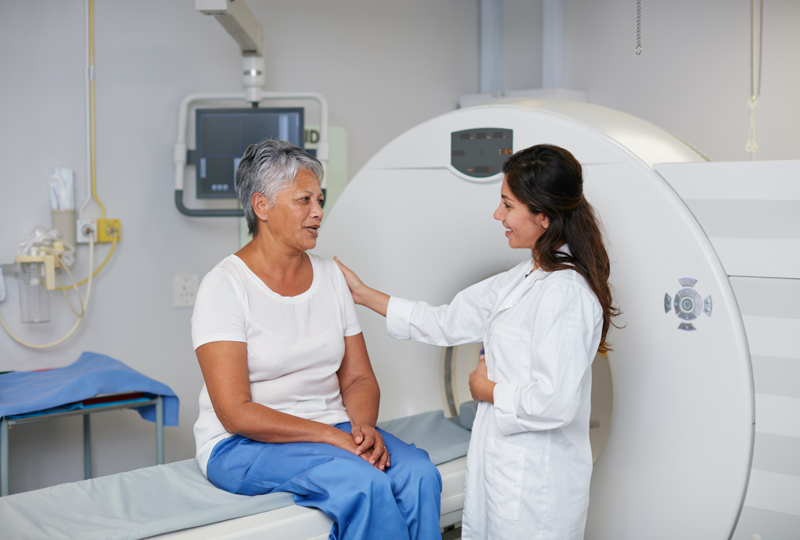Find out what to expect in terms of testing, the first step towards treating your cancer.
After you are diagnosed with lung cancer, you will likely undergo tests to determine the type of cancer you have and whether it has spread to other parts of your body. Your blood or biopsy specimen also will be examined to determine if there are alterations in the cancer to allow for different types of treatment. Together, these tell your health care team how best to treat the cancer.
“Although undergoing these tests can feel cumbersome, they are essential for your health care team to recommend the best course of treatment,” said Dr. Robert Ramirez, an oncologist at Vanderbilt-Ingram Cancer Center. “Testing will reveal the necessary details to determine the best next steps.”
There are three main types of tests:
- Lab tests of biopsies or surgical samples to determine cancer type
- Imaging to check whether the cancer has spread to other parts of your body
- Other more specialized procedures to confirm the cancer’s spread
Biopsies and surgical samples to confirm cancer type
A biopsy or other type of surgical sample can not only confirm cancer, but it can also determine the specific type of lung cancer.
“If you are diagnosed with non-small cell lung cancer, a type of testing called molecular testing will determine if the cancer cells have mutations that allow the cancer to grow and spread,” Ramirez said. “These tests help determine if targeted therapy or immunotherapy could be effective.”
Imaging tests and scans to determine cancer spread
Your health care provider will likely use one or more imaging techniques to help determine the extent of the lung cancer and whether it has spread – or metastasized – to other parts of your body.
Common imaging technologies include:
- CT scans use X-rays to create detailed images that show where the cancer is in your chest and if it has spread to nearby areas.
- MRI scans use magnets, radio waves and computers to create detailed images that show if the cancer has spread to your bones or brain.
- Positron emission tomography (PET) scans that show your whole body are often done together with CT scans to provide important context. PET scans use a type of radioactive sugar inserted into your blood that collects in cancer cells and this is visible on the scan. “This can be useful if a CT scan shows an abnormal area and your doctor wants to determine if further testing is needed,” Ramirez said. “It is a standard test in the work up for lung cancer.”
- Whole-body bone scans are similar to PET scans, but they use a different radioactive material that collects in your bones, highlighting areas where cancer may have spread.
Other tests and procedures
Sometimes the results of imaging tests may be unclear or highlight areas of concern that need to be investigated or biopsied. In this case, there are other tests and procedures that can help.
These tests can include:
- Endobronchial or esophageal ultrasound: A long, thin lighted tube with an ultrasound at its tip is passed through your mouth into either your windpipe (endobronchial ultrasound) or food tube (esophageal ultrasound) to provide images that show if cancer has spread to your lymph nodes or caused other problems in the areas between your lungs. “No cuts are made, but the procedures are performed under anesthesia to keep you comfortable,” Ramirez said. The tools are able to take biopsies if needed.
- Mediastinoscopy: This procedure is also used to check the lymph nodes between your lungs but is performed while you are under anesthesia through a small cut in your neck. The surgeon can pass small cameras into the target area or use specialized tools to take biopsies.
- Bone marrow biopsy: This procedure is rarely used, but sometimes your doctor will want to confirm if the cancer has spread to your bone marrow. After numbing the area, the technician will use a thick needle to draw a sample for biopsy from your hip bone.

Personalized Care for Lung Cancer
The Vanderbilt-Ingram Cancer Center is a national leader in patient care and research. Vanderbilt offers the region’s most complete range of oncology care, from advanced imaging to team-based treatment options to genetic cancer medicine and the latest in therapies being studied in clinical trials. Our lung cancer specialists provide advanced, effective care tailored to individual needs.




